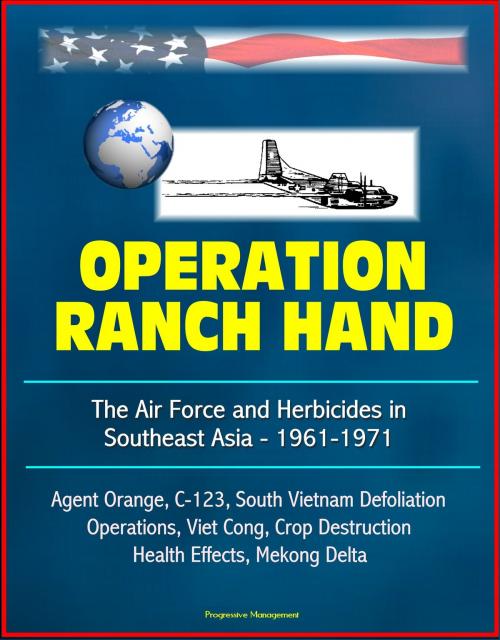Operation Ranch Hand: The Air Force and Herbicides in Southeast Asia - 1961-1971 - Agent Orange, C-123, South Vietnam Defoliation Operations, Viet Cong, Crop Destruction, Health Effects, Mekong Delta
Nonfiction, History, Military, Vietnam War, Asian, Aviation| Author: | Progressive Management | ISBN: | 9781310827525 |
| Publisher: | Progressive Management | Publication: | July 25, 2015 |
| Imprint: | Smashwords Edition | Language: | English |
| Author: | Progressive Management |
| ISBN: | 9781310827525 |
| Publisher: | Progressive Management |
| Publication: | July 25, 2015 |
| Imprint: | Smashwords Edition |
| Language: | English |
Professionally converted for accurate flowing-text e-book format reproduction, this Air Force publication provides a detailed history of the Air Force role in Operation Ranch Hand, which saw eighteen million gallons of chemicals sprayed on an estimated twenty percent of South Vietnam's jungles, including thirty-six percent of its mangrove forests. The Air Force also carried out herbicide operations in Laos from December 1965 to September 1969 with the permission of the Laotian government.
One of a series of books detailing the Air Force's involvement in the war in Southeast Asia, this volume was written by Major William A. Buckingham, Jr., while assigned to the Office of Air Force History. The author rightly emphasizes that the Air Force served as an instrument of national policy in conducting the herbicide spraying. The book is a model study of the process by which military policy was made in the Southeast Asia War. Major Buckingham relates the intense controversy, both within the government and among the public, over the military, political, and ecological effects of the program. He connects policy to the operations, showing how pressure from scientists and disagreements among government policymakers and military leaders imposed limitations on the spraying program. He explores the technical difficulties in using herbicides: the right chemical agents had to be delivered in sufficient quantity at the optimal time of the growing season, only against certain crops and categories of vegetation, and only in areas where the destruction provided harm to the enemy and no danger to friendly or neutral populations. And Major Buckingham pays tribute to the bravery of the Ranch Hand airmen who flew their planes "low and slow" over territory often heavily defended by the enemy. Remarkably, Ranch Hand's UC-123 Providers took more than seven thousand hits from ground fire, but lost only a few crews and aircraft. Indeed, the most celebrated of the planes, "Patches," survived over six-hundred hits.
The Ranch Hand operation was unique in the history of American arms, and may remain so. In April 1975, President Ford formally renounced the first use of herbicides by the United States in future wars. "As long as this policy stands," Major Buckingham writes, "no operation like Ranch Hand could happen again."
Operation Ranch Hand: The Air Force and Herbicides in Southeast Asia * Chapter I - The Development of a Military Herbicide Capability * Chapter II - The Decision to Send Spray-Equipped C-123s to South Vietnam * Chapter III - The Deployment of Spray Aircraft to South Vietnam and Initial Defoliation Operations * Chapter IV - Early Evaluations and Expanded Operations * Chapter V - Crop Destruction Begins and Washington Further Relaxes Controls on Defoliation * Chapter VI - Ranch Hand's Mission Expands and Becomes Routine VII. Herbicides Reach Their Peak While the War Deepens and Widens * Chapter VIII - Herbicide Use Declines * Chapter IX - Ranch Hand Ends Its Work * Chapter X - Epilogue
Professionally converted for accurate flowing-text e-book format reproduction, this Air Force publication provides a detailed history of the Air Force role in Operation Ranch Hand, which saw eighteen million gallons of chemicals sprayed on an estimated twenty percent of South Vietnam's jungles, including thirty-six percent of its mangrove forests. The Air Force also carried out herbicide operations in Laos from December 1965 to September 1969 with the permission of the Laotian government.
One of a series of books detailing the Air Force's involvement in the war in Southeast Asia, this volume was written by Major William A. Buckingham, Jr., while assigned to the Office of Air Force History. The author rightly emphasizes that the Air Force served as an instrument of national policy in conducting the herbicide spraying. The book is a model study of the process by which military policy was made in the Southeast Asia War. Major Buckingham relates the intense controversy, both within the government and among the public, over the military, political, and ecological effects of the program. He connects policy to the operations, showing how pressure from scientists and disagreements among government policymakers and military leaders imposed limitations on the spraying program. He explores the technical difficulties in using herbicides: the right chemical agents had to be delivered in sufficient quantity at the optimal time of the growing season, only against certain crops and categories of vegetation, and only in areas where the destruction provided harm to the enemy and no danger to friendly or neutral populations. And Major Buckingham pays tribute to the bravery of the Ranch Hand airmen who flew their planes "low and slow" over territory often heavily defended by the enemy. Remarkably, Ranch Hand's UC-123 Providers took more than seven thousand hits from ground fire, but lost only a few crews and aircraft. Indeed, the most celebrated of the planes, "Patches," survived over six-hundred hits.
The Ranch Hand operation was unique in the history of American arms, and may remain so. In April 1975, President Ford formally renounced the first use of herbicides by the United States in future wars. "As long as this policy stands," Major Buckingham writes, "no operation like Ranch Hand could happen again."
Operation Ranch Hand: The Air Force and Herbicides in Southeast Asia * Chapter I - The Development of a Military Herbicide Capability * Chapter II - The Decision to Send Spray-Equipped C-123s to South Vietnam * Chapter III - The Deployment of Spray Aircraft to South Vietnam and Initial Defoliation Operations * Chapter IV - Early Evaluations and Expanded Operations * Chapter V - Crop Destruction Begins and Washington Further Relaxes Controls on Defoliation * Chapter VI - Ranch Hand's Mission Expands and Becomes Routine VII. Herbicides Reach Their Peak While the War Deepens and Widens * Chapter VIII - Herbicide Use Declines * Chapter IX - Ranch Hand Ends Its Work * Chapter X - Epilogue















